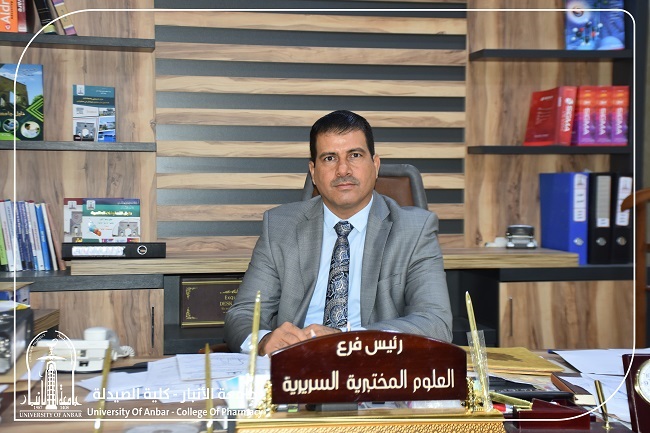Assistant Professor Dr. Youssef Hindi Khalaf - Head of Clinical Laboratory Sciences Branch - College of Pharmacy - University of Anbar obtained two patents related to the design of new systems for preparing nanocomposites from different sources, the first patent (designing a new system for preparing nanocarbons in different forms) with doctoral student Muhammad Fayyad Nayef is under his supervision with the supervisor Prof. Ahmed Mishaal Muhammad - a teacher at the College of Science, where the idea is based on the design of a system in which oil waste (synthetic oils) is used to produce three forms of carbon symbolized by the symbols (A, B and C) where the form A) produces a carbon compound similar to asphalt, either Figure (B) produces a carbon compound with a size ranging from (64-110) nm, which was used to prepare multi-walled carbon nanotubes using ultrasound technology. 48.2-73.69), which has shown promising applications in various medical fields including anticancer drug delivery systems using photodynamic therapy, and HIV drugs (the 1996 Nobel Prize in Chemistry was awarded to Kroto, Curl and Smalley for their fundamental discovery of Fullerenes). The resulting nanocomposites from (B and C) were applied in the treatment of the PC3 prostate cancer cell line using thermal treatment technology by near-infrared laser (NIR) with a wavelength of 1064 nm and a very low intensity. The study gave good results in inhibiting the tested cancer cells. Obtaining the highest killing rate of (58.6%) at a concentration of (25 µg/ml) and an estimated time of 10 minutes.
The second patent (designing a new system for preparing nanocomposites using the green method) with doctoral student Ali Samir, also under his supervision with the supervisor Prof. Ahmed Mishaal Muhammad - a teacher at the Faculty of Science, the goal of manufacturing this system was to save time and effort consumed during the preparation of the extract and the nanomaterial, as the idea is based on conducting the process of preparing nanoparticles in an automated way by sending instructions to the system through programming to begin the process of preparing plant extracts in an automated manner Sequential and integrated using a Buchner device that was designed to suit the work of the system, and then the resulting extract is added to the solution of the material to be prepared in an automatic way to obtain the material in its nano form, and then the process of preparing the nanomaterial is stopped and the system is automatically turned off. This system was used to prepare gold and platinum nanoparticles using extracts of Sidr and Bomber leaves, and then the resulting nanomaterial was used in synergy with a near-infrared (NIR) laser in heat treatment against breast cancer cell line MCF-7, and significant results were obtained in cell inhibition. The tested carcinogenicity and the cytotoxicity reached (74 and 88)% at a concentration of 40 ppm and an irradiation time of 120 seconds for nano-gold prepared from the extract of Bamber and Sidr leaves, respectively, and the cytotoxicity was (79 and 75%) at the same concentration and irradiation time for nano-platinum prepared from the extract of leaves Bamber and Sidr respectively.
Congratulations to the College of Pharmacy and Anbar University for this great achievement.





